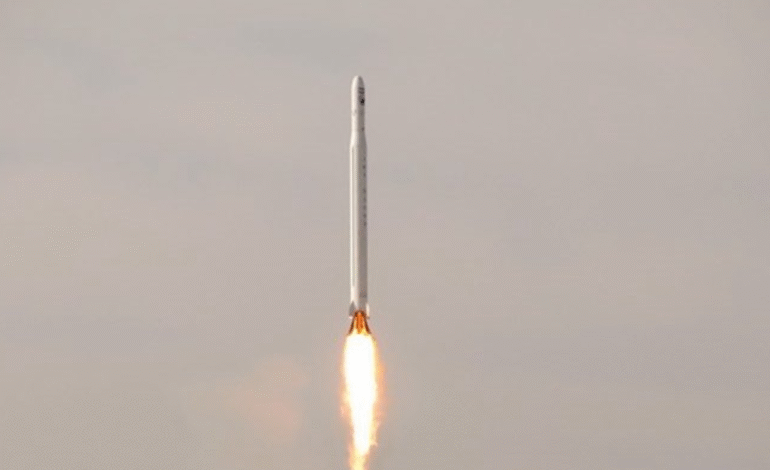Iran Conducts First Qased Rocket Test Post-War with Israel, Emphasizes New Technologies

In a move signaling renewed focus on strategic self-reliance and technological advancement, the Islamic Republic of Iran has announced the successful suborbital testing of its Qased rocket system marking the first such missile-related activity since the conclusion of the recent war with Israel. The launch, confirmed on Monday by Iranian state-affiliated news agency Tasnim, was described as a technological evaluation rather than a satellite launch mission.
The Islamic Revolutionary Guard Corps (IRGC) led the test, utilizing the Qased rocket, a three-stage hybrid vehicle first introduced publicly in 2020. Officials emphasized that the test was designed to assess “new technologies” embedded within the system’s propulsion, guidance, and control structures. Iran has stated the data from this test will bolster its broader space capabilities, although international observers remain skeptical of the program’s dual-use potential.
Launch Aimed at Technological Enhancement, Not Orbit Deployment
According to Iranian sources, the Qased rocket did not carry a satellite payload and was never intended to achieve orbit. Instead, the test focused on suborbital performance metrics allowing Iranian engineers to verify upgrades to components that could apply to both military and civilian aerospace operations.
A statement released by the IRGC’s Aerospace Division noted that, “The recent test flight of the Qased rocket was a critical step toward refining systems that will contribute to the development of future satellite launch vehicles and other aerospace technologies.”
Notably, the test comes on the heels of Operation Rising Lion, a large-scale Israeli military campaign targeting Iranian missile infrastructure. Iranian officials claim that despite significant damage inflicted by Israeli airstrikes, core facilities remain operational and resilient, enabling further development in strategic missile programs.
International Concerns Over Dual-Use Technology
While Iran insists its space program is civilian in nature, Western governments, particularly the United States and members of the European Union, have expressed long-standing concern that the same technologies used for launching satellites could be adapted for intercontinental ballistic missiles (ICBMs). The Qased rocket, which combines solid and liquid fuel stages, has been previously viewed as a prototype for dual-use engineering.
In Washington, Pentagon spokesperson Lt. Col. Sarah Henders issued a brief response: “We are aware of reports regarding Iran’s missile activities. While Iran claims peaceful intentions, its lack of transparency and continued defiance of UN resolutions remain troubling.”
The Qased test is likely to intensify scrutiny from international bodies, particularly as the United Nations Security Council’s embargo on Iranian ballistic missile development remains a point of contention.
Revival of Diplomatic Engagement with Europe
Coinciding with the missile test, Iranian authorities also confirmed the resumption of nuclear negotiations with key European nations. Diplomats from the United Kingdom, France, and Germany three signatories of the Joint Comprehensive Plan of Action (JCPOA) are scheduled to meet Iranian officials in Istanbul on Friday.
This will mark the first direct diplomatic engagement between Iran and the so-called E3 since the war with Israel erupted and since Israeli and American forces jointly struck Iranian nuclear facilities in coordinated air raids.
The European trio has reportedly issued an ultimatum to Tehran: restart negotiations immediately or face a reimposition of the full range of economic sanctions that were lifted under the 2015 nuclear agreement.
Iran’s response has been firm but not dismissive. In a formal letter to United Nations Secretary-General António Guterres, Iranian Foreign Minister Abbas Araghchi accused European governments of facilitating Israeli aggression and stated they “lack the legal standing to unilaterally revive sanctions.” Nevertheless, Tehran has agreed to attend the talks, though it is avoiding direct negotiations with the United States for now.
Tehran Seeks Sanctions Relief and Security Guarantees
Iran’s stated goal in returning to the negotiating table is clear: the lifting of economic sanctions that have strangled key sectors of its economy, from banking to oil exports. The Iranian parliament, in a recent session, outlined several preconditions for future U.S. involvement in talks, though these conditions were not disclosed publicly.
Foreign Minister Araghchi added in a televised address that Iran also seeks “binding guarantees” that future attacks on its nuclear and missile sites will not recur. “Iran cannot continue to engage in diplomacy while under military threat,” he stated. “We require international assurances.”
Meanwhile, Iran’s Supreme National Security Council has approved a proposal to include non-Western observers possibly from Russia and China in future JCPOA discussions, a move that may complicate Western leverage.
Israel Remains Watchful as Iran Reasserts Missile Capabilities
Israeli defense officials responded to the Iranian missile test with alarm. While the test was not aimed at satellite deployment or military aggression, officials in Tel Aviv view it as a provocative demonstration of Iran’s refusal to scale back its military ambitions following Operation Rising Lion.
Rear Admiral Daniel Hacohen, head of Israel’s Strategic Operations Command, said during a press briefing, “Any form of missile testing by the Iranian regime must be interpreted in the context of regional destabilization. It is not an isolated event it is part of a larger doctrine.”
Sources within Israel’s intelligence community also speculated that the test may have been timed deliberately to precede nuclear talks in Istanbul, acting as a strategic message to both regional rivals and European negotiators.
Broader Implications for the Gulf and UAE
The United Arab Emirates and other Gulf Cooperation Council (GCC) nations are closely monitoring these developments. While the UAE maintains relatively stable relations with Iran compared to its regional neighbors, the resurgence of missile tests especially those with military-adjacent capabilities raises concerns about strategic balance and defense preparedness in the Gulf region.
An Emirati security analyst based in Abu Dhabi, who requested anonymity, said: “While Iran claims to focus on space, the overlap with ballistic missile technology is concerning. GCC countries must calibrate their diplomatic posture accordingly, especially in anticipation of future military advancements.”
The analyst also emphasized the need for enhanced regional cooperation on missile defense systems, which could see the UAE strengthening defense ties with the United States, France, and Israel.
Iran’s Long-Term Strategic Message
Iran’s decision to conduct a Qased test and announce it publicly despite heightened scrutiny suggests a larger strategic narrative. Tehran appears determined to demonstrate resilience, technological growth, and sovereignty, particularly in the aftermath of a military conflict that exposed vulnerabilities in its defense network.
Moreover, by aligning the missile test with the resumption of nuclear talks, Iran is shaping a dual-message strategy: one of technological might and one of diplomatic engagement. Tehran is telling the world that it will pursue both space exploration and international dialogue on its own terms.
Strategic Messaging Behind Iran’s Missile Test
Iran’s recent suborbital test of the Qased rocket marks a pivotal moment in the post-war Middle Eastern strategic landscape. It reaffirms the country’s capability to maintain and evolve its missile program despite recent Israeli airstrikes and sanctions. As Tehran prepares to re-enter nuclear discussions with European powers, the region braces for a complex interplay of diplomacy and deterrence. The Gulf states, particularly the UAE, remain focused on ensuring regional stability while preparing for potential ripple effects.
Whether the new round of diplomacy in Istanbul can lead to lasting agreements or further entrench geopolitical divisions remains to be seen. For now, Iran has made its intentions unmistakably clear: it will defend its sovereignty through both technological progress and diplomatic negotiations.







